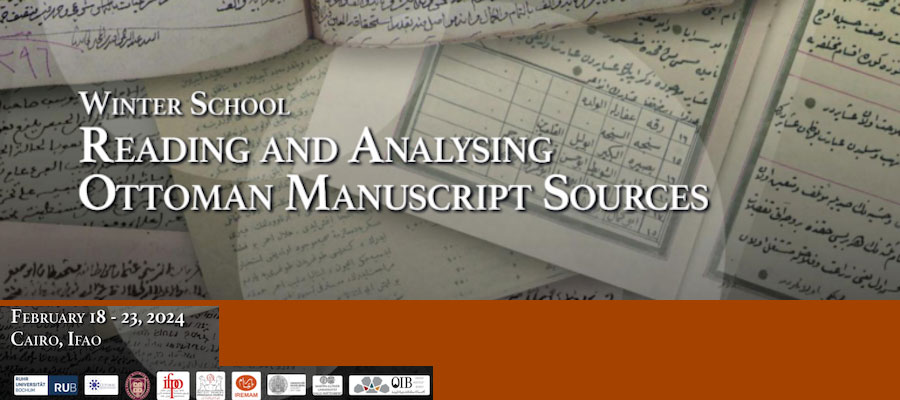Reading and Analysing Ottoman Manuscript Sources, Cairo, February 18–23, 2024
The French Institute for Oriental Archaeology in Cairo (IFAO) in cooperation with the Islamic Studies Department of the University of Halle-Wittenberg, the French Institute of the Near East (Ifpo), the Center for Turkish, Ottoman, Balkan and Central Asian Studies (CETOBaC), the Institute of Research and Study on the Arab and Islamic Worlds (IREMAM), the Department for Oriental and Islamic Studies at Ruhr-Universität Bochum, the Seminar für Sprachen und Kulturen des Vorderen Orients, Abteilung Islamwissenschaft at Universität Heidelberg, the Social Sciences University of Ankara (ASBÜ) and the Orient-Institut Beirut (OIB) invite students to participate in an international winter school devoted to reading and analysing Ottoman manuscript sources, with a particular focus on archival documents. This is the fifth edition of this format, following the summer schools of 2016 in Amman (Jordan), 2017 in Beirut (Lebanon), 2018 in Aix-en-Provence (France), Ankara (Turkey), and 2022 in Wittenberg-Berlin (Germany).
The winter school aims to overcome the initial difficulties researchers often face when working with archival documents from the Ottoman period, one of which has to do with technical terminologies no longer in use today. Today, early-career scholars often feel helpless when faced with Ottoman archival material in Ottoman Turkish or other languages used in the Empire, and they need to develop their skills in palaeography and philology. Besides, dialogue and exchange remain limited between the different schools of Ottoman history, particularly between scholars focusing on the analysis of imperial dynamics (who are generally specialists in the Ottoman language) and those who concentrate on the provinces of the Empire and who therefore work on sources produced in local languages.
The five-day programme will introduce young researchers (mostly MA and Ph.D. candidates, though postdocs may also apply) to reading, combining and analysing manuscript sources from various archives of the Ottoman era, produced at the local, provincial and imperial levels. Materials from the 16th through the 20th centuries will receive most of our attention, but explorations into earlier archives are welcome.
Sessions will focus on the study of archives in Ottoman Turkish, Arabic and other languages (Coptic, Armenian, Greek, Hebrew, etc.) so as to provide future historians with the skills necessary to use such sources within the framework of their research projects. The objective is to foster an exchange around theory and methodology among specialists of different regions of the empire. Coping with different languages is key to a comprehensive analysis of local dynamics in various provinces, be it on administrative, economic and social topics or in religious studies and belles-lettres.
An additional aim of the winter school is to encourage the use of manuscript sources in different languages by facilitating the identification and knowledge of diverse archival holdings. Bringing together specialists of different regions and subjects will encourage the exchange of information on archival repositories, their history, accessibility, and catalogues.
The winter school consists of small-group workshops allowing trainees to read and discuss archival documents with specialists familiar with different types of documents. During workshops, students will be asked to read and analyze a document of their choice.
Presentations of Ottoman archives and research tools in palaeography as well as discussions about methodology will be provided. Furthermore we will spend time visiting archives and explore their Ottoman holdings.
The working language of the winter school is English.
The winter school will accept up to 20 students depending on available funding. About 10 researchers and professors from Egyptian, German, French, and Jordanian universities will participate in the winter school as instructors.
Students enrolled in a Master or Ph.D. programme as well as researchers at an early post-doctoral stage, regardless of nationality, can apply for this winter school, provided that his or her research project requires the use of Ottoman source materials in Ottoman Turkish or other relevant languages.
No tuition fees will be charged. Selected students will be offered full coverage of the winter school costs, including accommodation and meals (breakfast and lunch), round-trip transportation from their country or place of residence to Cairo, excursions and visits.
